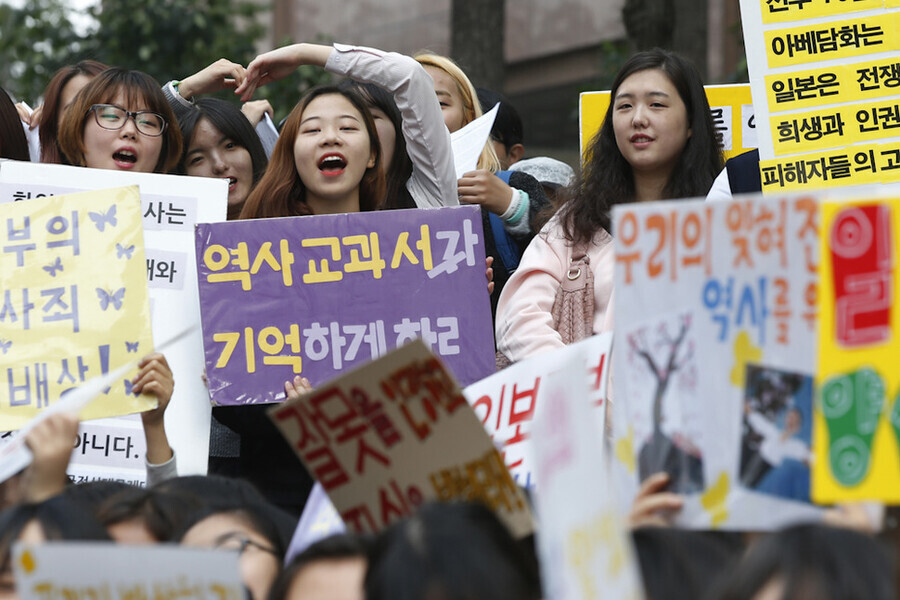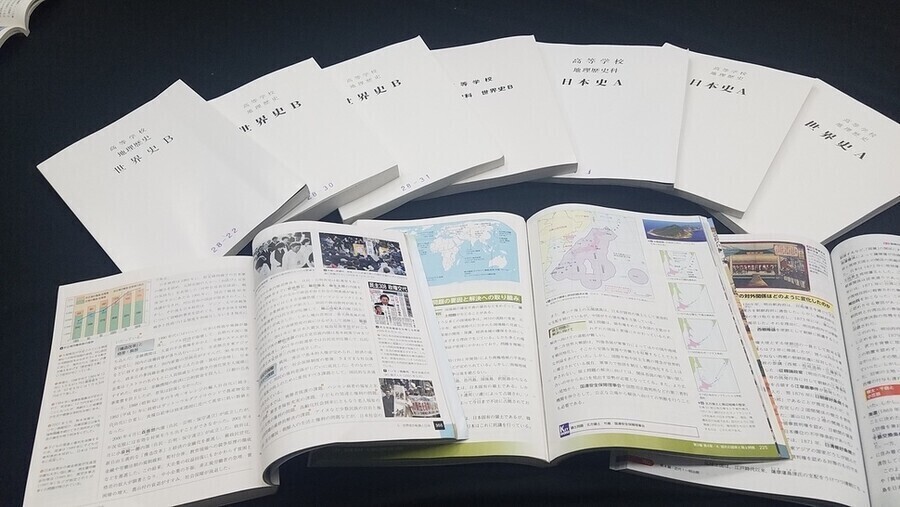hankyoreh
Links to other country sites 다른 나라 사이트 링크
Japanese military’s role in “comfort women” system of sexual slavery has disappeared from the country's textbooks

Depictions in Japanese textbooks of the “comfort women” system of sexual slavery by the imperial Japanese military have varied considerably as Japanese society has lurched toward the right.
Since the Japanese government promised to preserve the memory of the comfort women issue through research and education in the Kono Statement in August 1993, descriptions of the subject were added to high school textbooks in 1994 and to middle school textbooks in 1997.
The middle school textbooks were particularly irritating for Japan’s right-wingers, who objected that young children shouldn’t be taught a “masochistic” view of history. Pressure from the right led to a massive drop in coverage of the subject by the next time the government reviewed the textbooks.
The comfort women issue appeared in all seven textbooks that passed the government’s review in 1996 (and were distributed to schools in 1997), but that number fell to three in 2002 and two in 2006. None of the textbooks covered the topic in 2012, but it returned to one textbook in 2017 and then to two out of eight textbooks in the most recent assessment in 2021.
The most faithful treatment of the comfort women appears in publishing house Manabisha’s textbook, which was written by former and current teachers. According to that textbook, “Testimony by Kim Hak-soon, a Korean woman, in 1991 led the Japanese government to carry out an investigation into human rights abuses resulting from wartime violence against women. Then in 1993, the government published a statement that expressed an apology and remorse.”
However, the Manabisha textbook hasn’t been picked up by many schools. The textbooks that are most commonly assigned to students are those that have omitted any coverage of the comfort women since 2002. The result is that decent education on the comfort women subject has been basically impossible for the past two decades.

The comfort women issue had been covered in a variety of textbooks in the social sciences, including Japanese history, world history, geography, contemporary society, ethics, politics and economics since 1994, with 19 out of 20 Japanese history textbooks covering the comfort women issue at the time. But since 2000, coverage of the comfort women topic has gradually faded from high school textbooks amid a growing sense that the subject is no longer mandatory.
The Japanese school curriculum underwent a major change in 2021. As part of that, a course that integrates world history and Japanese history while emphasizing contemporary and modern history became mandatory last year.
The comfort women issue was covered by nine of 12 textbooks for this integrated history course, which is studied by all Japanese students in the first year of high school. But only one textbook (by Yamakawa Publishing) mentions that the comfort women were forcibly recruited, as the Kono Statement acknowledged.
Phrases that identified the perpetrators of the system such as “comfort women for the Japanese military” disappeared from all textbooks about Japanese history, politics and economics for second- and third-year high school students that were approved in the 2022 government review. That followed a decision by the Japanese cabinet in April 2021 that the expression “comfort women for the Japanese military” is inappropriate to use.
Publishers are obliged to respect the government’s decision, even if they don’t agree with it. That’s in line with a new rule for textbook assessments made by the Shinzo Abe cabinet in 2014 that textbook descriptions must be in keeping with consensus government opinions when any such opinions apply.
By Kim So-youn, Tokyo correspondent
Please direct questions or comments to [english@hani.co.kr]

Editorial・opinion
![[Column] Season 2 of special prosecutor probe may be coming to Korea soon [Column] Season 2 of special prosecutor probe may be coming to Korea soon](https://flexible.img.hani.co.kr/flexible/normal/500/300/imgdb/original/2024/0426/3317141030699447.jpg) [Column] Season 2 of special prosecutor probe may be coming to Korea soon
[Column] Season 2 of special prosecutor probe may be coming to Korea soon![[Column] Park Geun-hye déjà vu in Yoon Suk-yeol [Column] Park Geun-hye déjà vu in Yoon Suk-yeol](https://flexible.img.hani.co.kr/flexible/normal/500/300/imgdb/original/2024/0424/651713945113788.jpg) [Column] Park Geun-hye déjà vu in Yoon Suk-yeol
[Column] Park Geun-hye déjà vu in Yoon Suk-yeol- [Editorial] New weight of N. Korea’s nuclear threats makes dialogue all the more urgent
- [Guest essay] The real reason Korea’s new right wants to dub Rhee a founding father
- [Column] ‘Choson’: Is it time we start referring to N. Korea in its own terms?
- [Editorial] Japan’s rewriting of history with Korea has gone too far
- [Column] The president’s questionable capacity for dialogue
- [Column] Are chaebol firms just pizza pies for families to divvy up as they please?
- [Column] Has Korea, too, crossed the Rubicon on China?
- [Correspondent’s column] In Japan’s alliance with US, echoes of its past alliances with UK
Most viewed articles
- 1After election rout, Yoon’s left with 3 choices for dealing with the opposition
- 2Why Kim Jong-un is scrapping the term ‘Day of the Sun’ and toning down fanfare for predecessors
- 3Two factors that’ll decide if Korea’s economy keeps on its upward trend
- 4Noting shared ‘values,’ Korea hints at passport-free travel with Japan
- 5AI is catching up with humans at a ‘shocking’ rate
- 6Why Korea shouldn’t welcome Japan’s newly beefed up defense cooperation with US
- 7‘We must say no’: Seoul defense chief on Korean, USFK involvement in hypothetical Taiwan crisis
- 8Exchange rate, oil prices, inflation: Can Korea overcome an economic triple whammy?
- 9Terry Anderson, AP reporter who informed world of massacre in Gwangju, dies at 76
- 10[Reportage] On US campuses, student risk arrest as they call for divestment from Israel